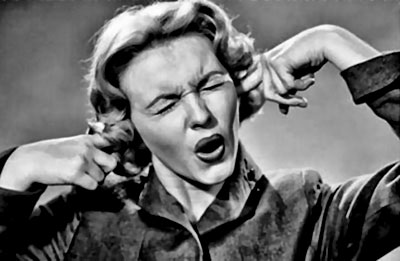I love to sing, and every once in a while — I just can’t help it. I break into song — sometimes in public. Yet despite several arrests and contusions from frustrated music critics (everybody is a critic), I persist.
I have been told (mainly by the other voices in my head) that I once had a good voice. Yet, in my many years experience in show business (hey — celebrities need their lawns mowed, too!) I have found that quality of voice is not of prime importance.

But I’m sure you have noticed some very popular singers — even Very Famous! — who have a rather unpleasant voice. Yet people love them and buy their recordings or watch them on TV and in films.
There are plenty of technically perfect singers. They have tremendous range, and their intonation is laser-accurate. I could name them all day (let’s see — ) … well, you could probably think of your own.
From earlier generations (you might have heard of them), there were very popular personalities who had less-than-perfect voices, and yet had stunning success.
Jimmy Durante was one of those. Everybody loved Durante. He was a lovable old codger, and his voice was pure gravel. He was also very funny. But his biggest hits were sentimental songs. When he sang “Young At Heart,” you could tell he would never put Sinatra out of business. But his wistful demeanor could bring a tear to your eyes. He could also sing “September Song,” and you would shiver with the dread of approaching the end of your mortal journey.
In an entirely another field, Louis Armstrong had not only gravel, but maybe ground glass for vocal cords. Yet he had tremendous hits like “Hello Dolly” and the immortal “Wonderful World” (tell me you don’t cry listening to that!).
Besides the rough voices, there are performers with weak voices — but strong emotional content — such as Fred Astaire. Fred, of course, was the greatest dancer of the golden age of the silver screen. He started out on the stage — Broadway, of course. The musical play was a perfect platform for dancing, but it demanded singing. Though his voice was weak, Fred could give the song pathos, bathos, and Aramis. In fact, the most prominent composers of the day brought their newest songs to him because he always delivered a huge audience — Irving Berlin, Cole Porter, George Gershwin.
Now some voices are just … ummm … hoarse. And I’m not sure that works all the time. Rod Stewart became a rock star with some of his early hits (especially with Jeff Beck and Small Faces), and his kind of voice fit in well. But, as many aging rockers have done, he gravitated toward easy listening and found a niche in the Great American Songbook revival of the first decade of the 2000s. His records were produced by another harsh, hoarse singer, Steve Tyrell (who won a 2004 Grammy for the collaboration). Was it because of “Rod The Mod’s” singing, or because of the beloved standards he sang? Even in his senior-citizen years, Rod has been a sex symbol for adoring fans.
A raspy voice is not entirely the domain of male singers. However, blues singers have used it to some artistic and pleasant ends. Janis Joplin became a legend with her soulful, rasp. Bonnie Tyler’s big hit “Total Eclipse Of The Heart,” sounded like she was ripping the organ from her body — mainly because of the pain in her voice. Melissa Etheridge and Kim Carnes (remember “Betty Davis Eyes?”) make you wonder if they are permanently damaging their vocal cords with such raspy voices. But the queen of the field (in my opinion) is Pat Benetar — whose range goes from operatic to deliciously raunchy.
And Tina Turner can’t be compared to anyone else. She is in her own category — like Irving Berlin is to songwriters.
Joe Cocker is also — for different reasons. He became an object of ridicule because of John Belushi’s imitation and the duet they did on Saturday Night Live. I don’t remember reading what Lennon & McCartney though about his version of “With A Little Help From My Friends” — although they were probably grateful for the royalties he brought in.
Leonard Cohen was mainly about the words — although his songs are melodic (when other singers perform them). He’s achieved sainthood, so we won’t make judgments about his singing quality. It’s kind of like judging a Stradivarius violin with and electronic violin.
Rod McKuen was another songwriter with a raspy voice. His songs were recorded by plenty of other singers with pleasant voices. I’m not sure his versions were very popular. He was, however, nominated for an Oscar for his theme song from “The Prime of Miss Jean Brody.” But plenty of award-winners didn’t break sales records.
Going back in time — Rose Marie (Yes, the same one from Dick Van Dyke) started her career as a child singer with a grown-up voice — Baby Rose Marie — and you can check her out on YouTube.
I guess you might think I’m making excuses if my voice is a little rough around the edges (or straight through), but beautiful singing is in the ear of the beholder, er, belistener, or … well anyway — enjoy music and never apologize, even if you like “Achy Breaky Heart.”
Leave a Comment